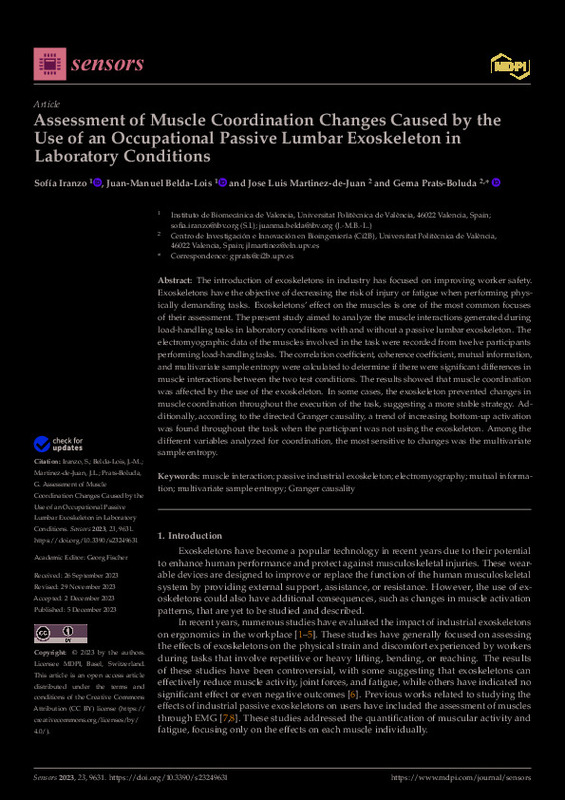JavaScript is disabled for your browser. Some features of this site may not work without it.
Buscar en RiuNet
Listar
Mi cuenta
Estadísticas
Ayuda RiuNet
Admin. UPV
Assessment of Muscle Coordination Changes Caused by the Use of an Occupational Passive Lumbar Exoskeleton in Laboratory Conditions
Mostrar el registro sencillo del ítem
Ficheros en el ítem
| dc.contributor.author | Iranzo-Egea, Sofía
|
es_ES |
| dc.contributor.author | Belda-Lois, Juan-Manuel
|
es_ES |
| dc.contributor.author | Martínez-de-Juan, José L.
|
es_ES |
| dc.contributor.author | Prats-Boluda, Gema
|
es_ES |
| dc.date.accessioned | 2024-01-12T19:02:00Z | |
| dc.date.available | 2024-01-12T19:02:00Z | |
| dc.date.issued | 2023-12 | es_ES |
| dc.identifier.uri | http://hdl.handle.net/10251/201892 | |
| dc.description.abstract | [EN] The introduction of exoskeletons in industry has focused on improving worker safety. Exoskeletons have the objective of decreasing the risk of injury or fatigue when performing physically demanding tasks. Exoskeletons' effect on the muscles is one of the most common focuses of their assessment. The present study aimed to analyze the muscle interactions generated during load-handling tasks in laboratory conditions with and without a passive lumbar exoskeleton. The electromyographic data of the muscles involved in the task were recorded from twelve participants performing load-handling tasks. The correlation coefficient, coherence coefficient, mutual information, and multivariate sample entropy were calculated to determine if there were significant differences in muscle interactions between the two test conditions. The results showed that muscle coordination was affected by the use of the exoskeleton. In some cases, the exoskeleton prevented changes in muscle coordination throughout the execution of the task, suggesting a more stable strategy. Additionally, according to the directed Granger causality, a trend of increasing bottom-up activation was found throughout the task when the participant was not using the exoskeleton. Among the different variables analyzed for coordination, the most sensitive to changes was the multivariate sample entropy. | es_ES |
| dc.description.sponsorship | This study was funded by Fundación Prevent. | es_ES |
| dc.language | Inglés | es_ES |
| dc.publisher | MDPI AG | es_ES |
| dc.relation.ispartof | Sensors | es_ES |
| dc.rights | Reconocimiento (by) | es_ES |
| dc.subject | Muscle interaction | es_ES |
| dc.subject | Passive industrial exoskeleton | es_ES |
| dc.subject | Electromyography | es_ES |
| dc.subject | Mutual information | es_ES |
| dc.subject | Multivariate sample entropy | es_ES |
| dc.subject | Granger causality | es_ES |
| dc.subject.classification | TECNOLOGIA ELECTRONICA | es_ES |
| dc.title | Assessment of Muscle Coordination Changes Caused by the Use of an Occupational Passive Lumbar Exoskeleton in Laboratory Conditions | es_ES |
| dc.type | Artículo | es_ES |
| dc.identifier.doi | 10.3390/s23249631 | es_ES |
| dc.rights.accessRights | Abierto | es_ES |
| dc.contributor.affiliation | Universitat Politècnica de València. Escuela Técnica Superior de Ingeniería del Diseño - Escola Tècnica Superior d'Enginyeria del Disseny | es_ES |
| dc.contributor.affiliation | Universitat Politècnica de València. Instituto Universitario Mixto de Biomecánica de Valencia - Institut Universitari Mixt de Biomecànica de València | es_ES |
| dc.contributor.affiliation | Universitat Politècnica de València. Escuela Técnica Superior de Ingenieros Industriales - Escola Tècnica Superior d'Enginyers Industrials | es_ES |
| dc.description.bibliographicCitation | Iranzo-Egea, S.; Belda-Lois, J.; Martínez-De-Juan, JL.; Prats-Boluda, G. (2023). Assessment of Muscle Coordination Changes Caused by the Use of an Occupational Passive Lumbar Exoskeleton in Laboratory Conditions. Sensors. 23(24):1-14. https://doi.org/10.3390/s23249631 | es_ES |
| dc.description.accrualMethod | S | es_ES |
| dc.relation.publisherversion | https://doi.org/10.3390/s23249631 | es_ES |
| dc.description.upvformatpinicio | 1 | es_ES |
| dc.description.upvformatpfin | 14 | es_ES |
| dc.type.version | info:eu-repo/semantics/publishedVersion | es_ES |
| dc.description.volume | 23 | es_ES |
| dc.description.issue | 24 | es_ES |
| dc.identifier.eissn | 1424-8220 | es_ES |
| dc.identifier.pmid | 38139478 | es_ES |
| dc.identifier.pmcid | PMC10747114 | es_ES |
| dc.relation.pasarela | S\504952 | es_ES |
| dc.contributor.funder | Fundación Prevent | es_ES |








